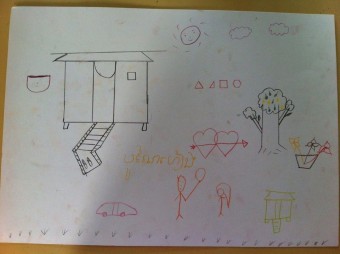
Surviving rape in Cambodia
Nai Lee, 14, lives in Banteay Meanchey, Cambodia. Her father, 53, and her mother, 52, are farmers and laborers. She has five brothers; she is the youngest and the only daughter. The family is very poor and Lee was not sent to school. Her mother would occasionally get work as a laborer along the Cambodia-Thailand border and would bring the children to stay temporarily with her cousin.
During one of those stays in late December 2013, Lee was raped by a strange man who came into the house while Lee was alone and asleep. She didn’t tell her mother what had happened, but four days later she told a neighbor.
Lee’s mother, hearing of what had happened from the neighbor, immediately took Lee to the police station. A complaint was filed and Lee’s case was then taken up by the Banteay Meanchey provincial police. Through interviews, the crime division police officers identified the suspect and he was arrested on in early January 2014.
Legally, the “incident’ was over. But not for Lee. Seeing her fear and emotional distress, the police suggested that Lee seek shelter and support at the help at the Cambodia Women’s Crisis Center (CWCC), Lotus Outreach’s local partner. Lotus Outreach’s program Counseling and Reintegration, which is funded by Dining for Women, is implemented through CWCC. The program works directly with victims of sexual assault like Lee, counsels them and further supports them during their reintegration into society.
Lee hated men. She could not relax. She spoke in a very loud voice when meeting with the counselors and the shelter staff. She had arguments with other clients in the shelter. She always headed down and pulled her fingernails while talking to the counselors. Lee received individual counseling and group therapy sessions. Techniques such as art therapy enabled her to give voice to her feelings of hurt and anger through drawing and painting. Over time, her anger lessened and Lee was more agreeable with other clients and able to get interested and even excited about things again. But she was not fully healed.
Lee wanted to go back home with her family so the CWCC reintegration team began working with her to develop a plan to return to normal life. Three weeks after she entered the CWCC program, Lee went home. She was armed with a life start-up grant that provided funding and home goods. DFW’s sustained grant to Lotus Outreach has already this year funded work with 84 survivors just like Lee. They included 16 rape victims, 30 trafficking victims and 38 subjected to domestic violence.
Lee’s family is happy to have her home. “I am happy for the quick actions by authorities and CWCC’s support… my daughter’s case has gone through the legal process and the perpetrator was arrested and is being prosecuted for his crime,” her mother said.
Nai Lee has been reintegrated back home. She is now living with her mother at Malay district, Banteay Meanchey. Her attacker was tried and sentenced to seven years in jail. Lee received financial compensation of 1.500.000 Khmer riel (US$375).
